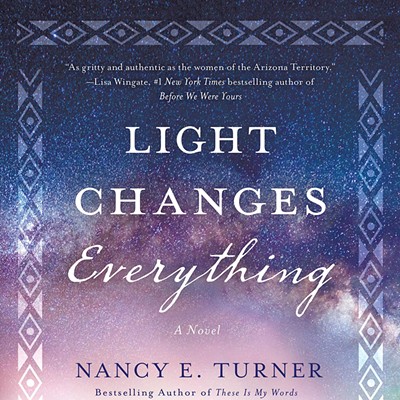Juniper Blue is the second in a trilogy planned by Prescott resident Susan Lang. An English instructor at Yavapai College and founder of the Hassayampa Institute for Creative Writing, Lang has set the series in the 1930s, on a homestead in a remote Mojave Desert canyon very much like one on which she grew up a decade later. In the first of the series, Small Rocks Rising, she introduced Ruth Farley, the 21-year-old daughter of an El Paso brothel owner who takes upon herself the difficulty of homesteading Glory Springs alone.
In Juniper Blue, after the murder of her lover, Jim, she deals with reconciling dualities--her past vs. her present, the civilization vs. wilderness, responsibility vs. freedom, reason vs. passion. That it's the era of Prohibition and the Depression also sets up societal oppositions.
At heart--and not-to-be-missed symbolically--lie the twins. Having consulted no doctor, Ruth is completely unprepared for the arrival of not one, but two, unwanted newborns. When the first appears--a boy as black-haired and dark-skinned as was Ruth's dead lover, Yuiatei Indian Jim--she's relieved. But when a second is delivered--a pale girl with carrot-red hair, she sees the unmistakable genetic marks of the white man who both killed Jim and raped her, and she can't bring herself to bond with her.
The freedoms Ruth had sought in staking out her own land far from critical and controlling society are severely curtailed by these two, and, in a postpartum funk, she doesn't even name them for two months. When she does, it's with no real thought to the children, but to Ruth's own past. The boy she names with initials only--"J.B.", as in "Jim's Boy"; the girl, "Madeline"--the middle name of Ruth's much hated mother, Cally.
Increasingly isolated, estranged from her mother, scorned by the people of the nearby town, Ruth musters up the courage to take toddler J.B. (but not Maddie) to Jim's Yuiatei Indian village. Ruth is welcomed by the dwindling tribe, and comes to admire their worldview and relationship with the natural world. That Maddie is soon as embraced by the group as J.B., and learns both its language and customs more easily than either she or J.B, is a source of irritation to Ruth, and she's barely able to resist revealing to the child her ignominious patrimony.
Selfish, resentful parenting comes to Ruth naturally, and soon, her own mother, Cally, makes an appearance. Against her better judgment, Ruth meets Cally in Los Angeles. Their meeting is greed-inspired and confrontational, but Ruth's subsequent evening releases a side of her that was long buried beneath work pants and baby- and goat-feeding schedules. At the suggestion of bad-boy actor/bellhop/hotel bootlegger Ben, she "borrows" some finery from the hotel shop and accompanies him to the Coconut Grove. There, drinking, dancing, flirting, Ruth feels free--imagining herself as glamorous as a character in a Fitzgerald novel. Free, that is, until one of the "beautiful people" snaps her out of it, and her Tolstoy-loving side kicks in, sending her fleeing to Glory Springs.
The novel has Ruth careening between opposites: between her taste for both Fitzgerald's jazzy glitz and Tolstoy's celebration of nature; between attraction for bad Ben and the solid archeologist David; between the lure of money associated with the new film industry moving into her area and her desire for physical self-sufficiency off the land; between "freedom" and responsibility. The "Juniper Blue" of the title is the name of a blue roan that finds its way to Ruth's homestead and would probably help her navigate between these opposites if she would let it, but she's a bit out of control.
To Lang's credit, Ruth stays in character with her practical, physical, reactionary, stubborn, straight-speaking, passionate, changeable, not-always-likable persona; and she avoids floating off into spiritual, supernatural or man-dependent realms. Lang doesn't freight the blue horse with symbolic or spiritual meaning (although readers could find it themselves); she doesn't assign unrealistic spiritual power to the Yuiatei people; and she doesn't fall back on romance-genre convention.
If you're not interested in women's daily activities of wilderness life, don't go here. But real love in Juniper Blue occurs between Ruth and her land, and Lang depicts it in polished, authentic, evocative prose. And Lang describes some desert-flour recipes and imagines a couple of memorable Yuiatei dance ceremony scenes that are well worth the price of admission.








